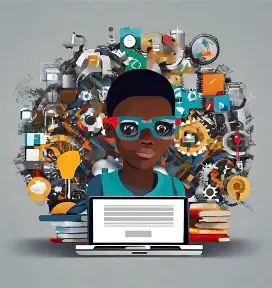How EdTech is Transforming Learning in Africa – Classrooms Without Walls, Learning Without Limits
By Rebecca Aboagyewah Oppong | Veebeckz Tech Media | Published on 19th April, 2024
In a small village in Ghana’s Bono East Region, a teenage girl connects to a virtual science class using a solar-powered tablet. In Nairobi, a group of students uses a gamified coding app to build their first website. In Lagos, an online tutoring platform helps a child with dyslexia learn through audio-visual lessons tailored to his pace. Across Africa, the traditional chalk-and-talk classroom is undergoing a quiet revolution—powered not by massive buildings, but by lines of code, fiber optics, and innovation.
Educational Technology (EdTech)— the use of digital tools to enhance teaching and learning—is transforming how Africans access, experience, and interact with education. As the youngest continent in the world, Africa’s education systems face enormous pressure to deliver relevant, inclusive, and scalable learning opportunities. According to UNESCO, sub-Saharan Africa still has the highest out-of-school rates globally, with over 98 million children and youth out of school as of 2023. But EdTech is changing that narrative—not by replacing teachers, but by reimagining how, when, and where learning happens.
The COVID-19 pandemic served as a massive accelerator. With schools closed across the continent, countries were forced to adopt hybrid and remote learning strategies almost overnight. In Ghana, the Ministry of Education partnered with e-learning platforms and television networks to deliver remote lessons. In Kenya and Rwanda, governments rolled out SMS-based learning tips for parents. In Nigeria, platforms like uLesson scaled rapidly, offering video-based learning for national curricula. These adaptations weren’t perfect, but they proved that tech-enabled education is not only possible—it is essential.
Today, the EdTech landscape in Africa is thriving. Startups, governments, NGOs, and universities are all exploring how digital tools can address long-standing education gaps.
1. Access and Inclusion
One of the most critical benefits of EdTech is how it democratizes access to quality learning. In rural areas where qualified teachers are scarce or where schools are under-resourced, mobile learning apps, radio lessons, and offline educational platforms bring content to learners who would otherwise be left behind.
Eneza Education in Kenya offers SMS-based lessons aligned with national curricula, reaching over 5 million learners without internet access. In Ghana, Learning Nuggets and TizaaWorks provide skill-building content for youth and job seekers. Veebeckz Tech Hub’s own SMAGTS initiative is introducing basic tech and science concepts to children in informal communities using project-based models and simple animations.
Inclusive EdTech is also supporting learners with disabilities. Tools like text-to-speech, screen readers, captioned videos, and gamified interventions help children with visual, hearing, and learning differences thrive. The Africa Dyslexia Organization, for example, is integrating assistive tools to support neurodiverse learners across Ghana and beyond. The future of education must be inclusive—and technology can help lead the way.
2. Teacher Empowerment
EdTech isn’t only about students. Teachers are benefiting immensely from online training, resource-sharing platforms, and professional learning communities. In Ghana, the GES Teacher Portal Ghana (TPG) offers digital certification, training modules, and access to teaching materials. Tools like Kolibri and Can’t Wait to Learn allow teachers in remote regions to deliver interactive content with minimal infrastructure.
More importantly, technology empowers teachers to personalize learning, track student progress in real time, and collaborate with peers across regions. This is critical in a context where large class sizes and curriculum overload often leave teachers overwhelmed and unsupported.
3. Curriculum and Skills Development
Today’s students are entering a world that demands not just literacy and numeracy, but digital literacy, critical thinking, creativity, and adaptability. EdTech enables learners to go beyond textbooks—to learn to code, design, animate, analyze data, and build real-world solutions.
Programs like Code Afrique, Junior Byte Explorers, and Africa Code Week are introducing thousands of children to coding and robotics. Veebeckz Tech Hub’s “Girls in Byte” initiative is grooming girls in Ghana to explore careers in AI, UI/UX design, and tech entrepreneurship. These are not just enrichment programs—they are lifelines for economic participation in the 21st century.
4. Affordability and Localization
Affordability is a make-or-break factor in Africa’s EdTech success. The best solutions are low-bandwidth, mobile-first, and culturally relevant. They must work offline or with minimal data, support local languages, and reflect local examples.
A great case is Mavis Talking Books in Ghana—solar-powered audio learning devices with local language content for primary students. These solutions are cheap, scalable, and incredibly effective. Localization is key—both in content and design.
Challenges and What Must Be Done
Despite the promise, EdTech is not a silver bullet. It is only as effective as the ecosystem it operates in.
Challenges include:
- Digital divide: Many students lack access to devices, electricity, and connectivity.
- Gender gaps: Girls are less likely to own phones or have digital skills.
- Poor infrastructure: Schools lack labs, routers, or even basic electricity.
- Policy lag: National education policies are often slow to recognize EdTech’s role.
To unlock the full potential of EdTech, we need:
- Strong partnerships between government, private sector, and local communities.
- Investment in teacher training and infrastructure.
- Monitoring and evaluation systems to assess impact.
- Youth-led innovation, especially from underserved communities.
EdTech is not about flashy apps—it’s about bridging opportunity gaps, nurturing curiosity, and preparing African learners for a dynamic world. In Ghana and across the continent, the seeds of transformation have been planted. What we need now is sustained investment, equity-focused design, and bold leadership.
The classroom is no longer a building. It is a network, a platform, a mindset. And Africa is ready to learn—and lead.
“EdTech is not about devices—it’s about dignity, access, and futures reimagined.”
